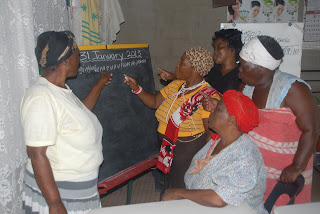The State of Literacy: 2013 and 2014
2013 is winding down. Countdowns and “top 10” lists of the year are popping up everywhere, including the Top 10 most watched YouTube videos , the Top 10 Medical Breakthroughs , and a Top 10 Everything , where you can look at 54 lists of the “bests” in 2013, developed by TIME Magazine. This also the time for lists for the coming year, such as Best Trips 2014 or Top 10 Food Trend Predictions for 2014 . We’ve joined the trend and here’s what we’ve developed as a Top List for Literacy in both 2013 and 2014: Top Moments for Global Literacy in 2013 International Literacy Day celebrations . September 8 has been designated by UNESCO as International Literacy Day and this year’s theme was “Literacies for the 21 st Century,” reflecting the idea that literacy is no longer just knowing how to read and write, but also means having the basic education to make one capable of participating fully within society. (See more here ) The Program for International Assessment of Adult



